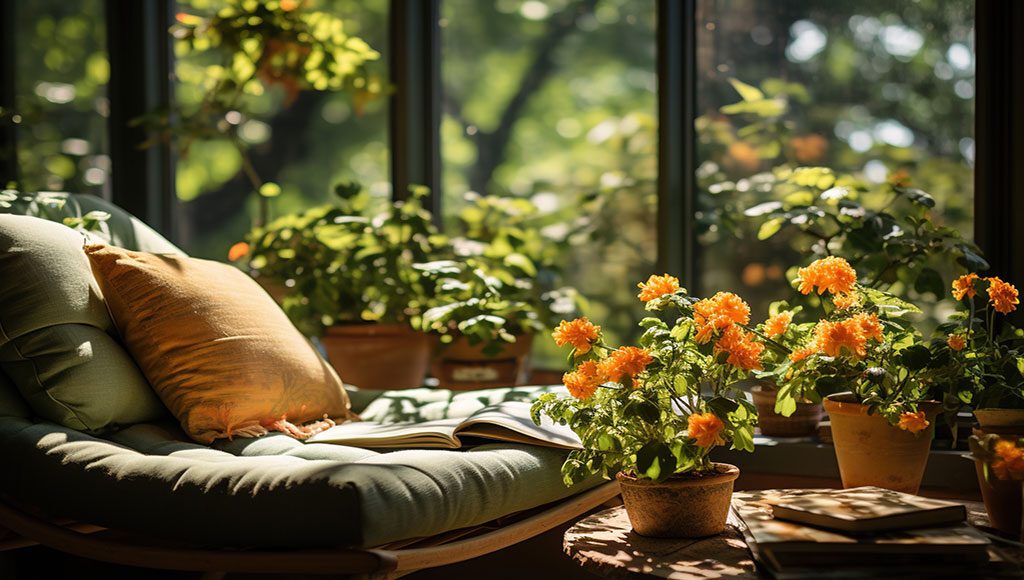
- Custom Exteriors
- April 30, 2024
The perfect sunroom: transform your home with natural light
As an exterior remodeling company based in Colorado, we are no strangers to the desire to increase the exposure to Colorado’s 300+ days of sunlight. We’ve added French doors, bay windows, and skylights. However, our favorite window installation is always the creation of a sunroom. The surrounding light creates a welcoming environment, and you want to be there!
Unfortunately, the cost of adding an actual sunroom often prohibits it. Extensive construction usually results in costs quickly skyrocketing. On the other hand, many areas of your home can easily be transformed into your dream sunroom at a fraction of the cost. Throughout the years, we have helped our customers turn dining areas, porches, and more into the relaxing retreat of a sunroom. Adding well-planned window walls and patio doors can create the same warm and welcoming vibe that a sunroom addition would.
So, are you considering a sunroom? Maybe just daydreaming about it? Colorado is known for abundant sunshine, making it an ideal location for outdoor enthusiasts, nature lovers, and those who appreciate the beauty of our clear skies and sunny weather. We’re going to cover the functional uses based on your lifestyle, plus other things to consider, such as location and direction.
What is a Sunroom?
Sunrooms are versatile spaces that connect to the outdoors while protecting homeowners from our quickly changing Colorado weather. They are essentially enclosed rooms with skylights, large windows, or glass walls designed to capture sunlight and create a bright, airy environment.
Sunrooms are popular for their ability to extend living space, serve as a relaxing retreat, and offer panoramic views of scenic landscapes. Some of our favorite benefits a sunroom offers are:
- Increased Natural Light
- Extended Living Space
- Increased Home Value
- Connection With Nature
- Year-Round Enjoyment
- Customizable Designs
The average cost of a sunroom addition runs from $20,800 to $72,600. It is noted that a small, converted sunroom could cost as little as $5000 to create, and an expansive, luxury sunroom could cost up to $140,000. ~ The Spruce
Popular Uses for sunrooms

1. Sunlit Lounge Area:
A sunroom provides an inviting space to relax and enjoy natural sunlight throughout the day. It can be finished with plants, and comfortable seating such as sofas, armchairs, and ottomans. It creates a cozy lounge area ideal for reading, socializing, or just enjoying the outdoor views while unwinding.
2. Indoor Garden or Greenhouse:
Sunrooms are excellent for housing indoor plants, creating a mini garden, or even functioning as a small greenhouse. The abundant natural light and controlled environment make them ideal spaces for growing a variety of plants, from decorative houseplants to herbs, flowers, and even small vegetables.
3. Dining Area:
Many homeowners use their sunrooms as a bright and airy dining space. It provides a refreshing alternative to traditional dining rooms, allowing occupants to enjoy meals while feeling connected to the outdoors. Adding a dining table and chairs transforms the sunroom into a charming breakfast nook or an elegant dining area for family gatherings and entertaining guests.
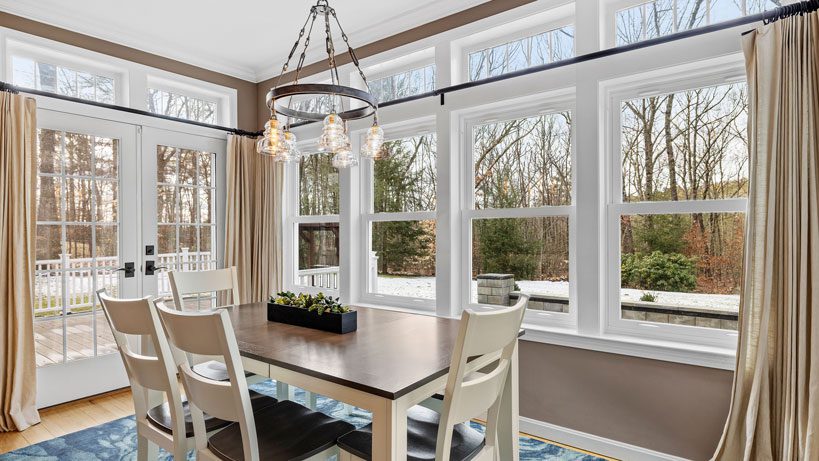
4. Home Office or workspace:
With the popularity of remote work and telecommuting, sunrooms make excellent home offices or workspace areas. The natural light promotes productivity and creates a pleasant environment for work-related activities. Setting up a desk, ergonomic chair, filing, and storage solutions can turn the sunroom into a productive and inspiring workspace.
5: Entertainment Room:
Sunrooms can be transformed into entertainment rooms, hosting activities such as game nights, movie screenings, or casual gatherings. Installing a media center with a television or projector, comfortable seating arrangements, and storage for games or entertainment equipment can make the sunroom a popular spot for relaxing and socializing.
6: Fitness or yoga studio:
Utilizing the sunroom as a fitness or yoga studio capitalizes on the open, well-lit space. It provides a naturally energizing environment for exercise equipment, yoga mats, and calming plants and decor, enhancing a sunroom as a dedicated wellness space.
7. Reading or hobby room:
Sunrooms offer a peaceful retreat for pursuing hobbies or just relaxing. It’s also a great space for crafting, painting, or hobbies like photography. Because of the abundance of natural light, the visibility and atmosphere are perfect for creativity or quiet relaxation.
8. Seasonal Retreat:
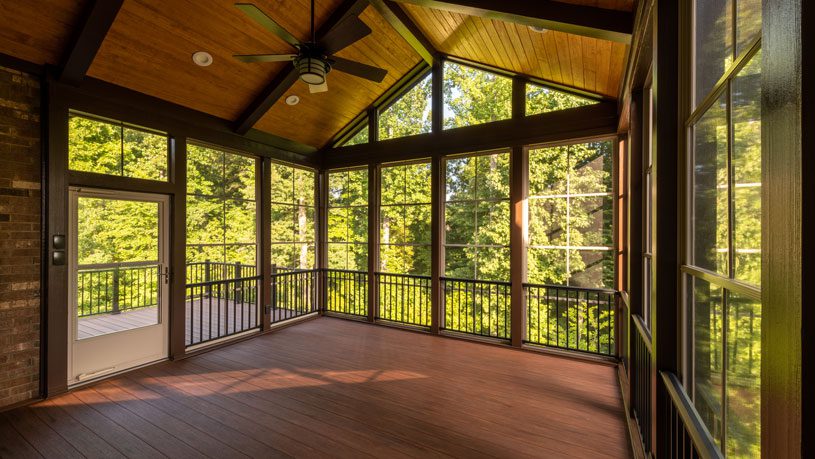
In Colorado’s climate, sunrooms can be used as year-round retreats. They can transition from a warm and cozy space in fall and winter, with the heat from our sunny days and the addition of heaters or a fireplace, to a breezy, open area in spring and summer, with ceiling fans or air conditioning. This flexibility allows homeowners to enjoy the sunroom year-round, adapting it to different seasons and weather conditions.
Ultimately, the use of a sunroom depends on your individual preferences, lifestyle needs, and how the space is customized and furnished to suit your family’s unique needs!
Create a custom sunroom by remodeling with new windows
With the right window replacement contractor, several existing rooms in a home can be transformed into sunrooms with some modifications. Our favorite sunroom installations have been in rooms with three exterior walls that were turned into three window walls! When executed properly, this creates a panoramic view that is stunning. With that being said, you can create a bright, beautiful sunroom in any area with two or more exterior walls. Some common areas Custom Exteriors has helped convert to a sunroom include:
1. Porch or Enclosed patio:
An existing porch or enclosed patio is a natural candidate for conversion to a sunroom, and we see it frequently. By adding insulation, proper flooring, and large windows, skylights, or glass walls, you can create a comfortable and inviting sunroom space while maintaining a connection to our beautiful outdoors. One of our favorite styles in this design includes a floor-to-ceiling, wall-to-wall, collapsible glass door. When closed, it provides as close to unobstructed as possible, and, when open, it literally opens an entire wall to nature. You can’t really beat that when trying to blend with the stunning landscape we enjoy in Colorado.
2. Any room with two or more exterior walls:
If your family room, entryway, or living room has ample natural light and access to outdoor views, it can be renovated into a sunroom. A cozy breakfast nook or dining area adjacent to a kitchen can be converted into a sunroom, creating a charming space for enjoying meals with plenty of natural light. Adding skylights to these rooms can also help add the feel of a true sunroom.
3. a Home addition:
Building an addition specifically designed as a sunroom is a popular option locally for homeowners looking to add a sunroom to their existing home. This allows you to customize the size, orientation, and features to meet your specific style and needs. When you create a space that is tailored to your preferences and lifestyle, you are often able to achieve the ideal sunroom for your family.
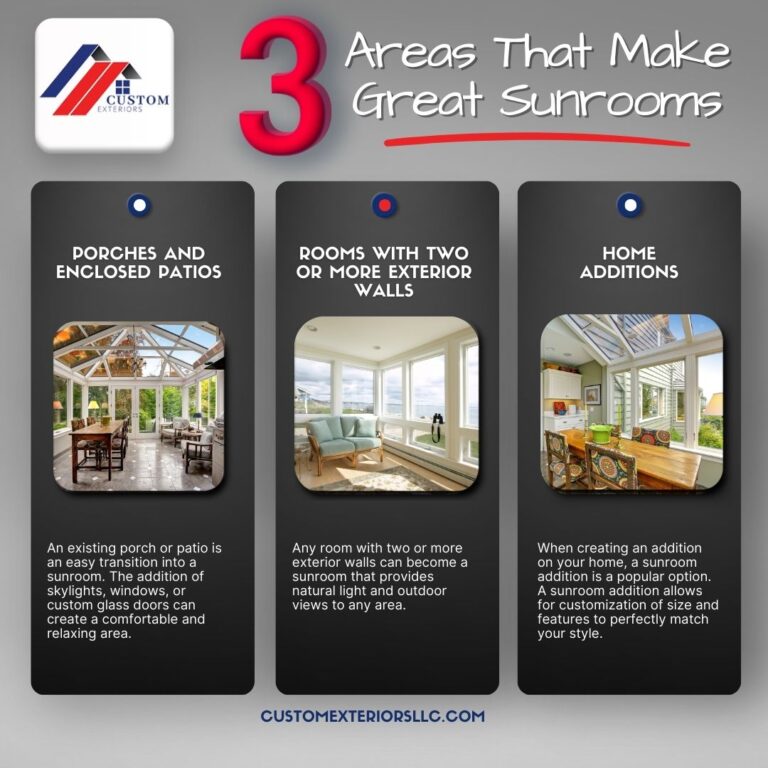
Which direction should my sunroom face?
The best direction to face a sunroom depends on the amount of sunlight you want and the use of the room. Here are some of the things our design experts consider when they are determining the ideal direction to face a sunroom:
1. Colorado's Climate and abundant sunlight:
During winter months, it’s beneficial to have a sunroom that faces towards the south to take advantage of the most sunlight and passive solar heat. South-facing sunrooms receive sunlight throughout the day, helping to naturally warm the space and reducing heating costs. However, during summer, direct south-facing sunlight can lead to overheating, so shading options like awnings or blinds may be necessary.
2. Views and landscape:
Consider the views and outdoor landscape surrounding your property. Facing the sunroom toward attractive views such as gardens, open spaces, mountains, or scenic landscapes improves your home’s overall curb appeal and enjoyment of the space. Take privacy considerations into account as well, especially if neighboring properties are nearby. This can also be dealt with by adding attractive blinds or window coverings. If there was ever a place to try out the remote control and electric window shades, it’s a sunroom.
3. Functionality and use:
The intended use of your sunroom will also affect its orientation. For example, if the sunroom will primarily serve as a dining area or breakfast nook, an east-facing orientation allows for pleasant morning sunlight and a cozy atmosphere for breakfast. West-facing sunrooms receive afternoon and evening sunlight, making them suitable for relaxation areas or sunset views, but they can become warmer in the afternoon.
4. Architectural Considerations:
Consider factors such as roof overhangs, window placement, and insulation to maximize energy efficiency and comfort in the sunroom throughout the year.
5. Balanced Lighting:
Depending on your preferences, a compromise orientation such as southeast or southwest facing can provide balanced lighting throughout the day. This approach ensures that the sunroom receives sunlight during different times while minimizing excessive heat gain or glare.
One last tip..
One last tip if you are considering a sunroom – check with your HOA (if you have one) and make sure you’re following their guidelines.
When we install windows or skylights for sunrooms, Custom Exteriors always follows local building codes and regulations. Make sure your contractor follows codes regarding sunroom construction and orientation requirements. Some areas may have specific guidelines or restrictions related to sunroom placement and orientation based on environmental factors and building codes.
Remember, the beauty of a sunroom lies in its versatility. It’s a space that can be tailored to your unique needs and preferences, balancing practicality and aesthetics. Whether you envision it as a cozy reading nook or a vibrant entertainment area, a sunroom can be a year-round haven. If you’re considering this project, reach out to one of our design specialists at Custom Exteriors. We’re a local contractor with extensive experience, ready to help you make informed decisions that perfectly suit your needs and location.
Contact Us Today
We Service and Support the Following Brands






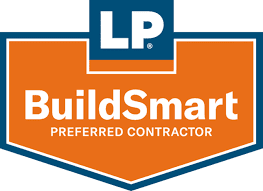



Contact
Custom Exteriors, LLC
18674 Co Rd 3, Berthoud, CO 80513
109 E. 17th St. Ste 5822, Cheyenne, WY 82001
102 S. Tejon St. Ste 1100, Colorado Springs, CO 80903
404 Broadway, Eagle CO 81631
Phone: 970-460-8714
Toll Free: 800-580-0131
Quick Links
© 2022 Custom Exteriors, LLC


